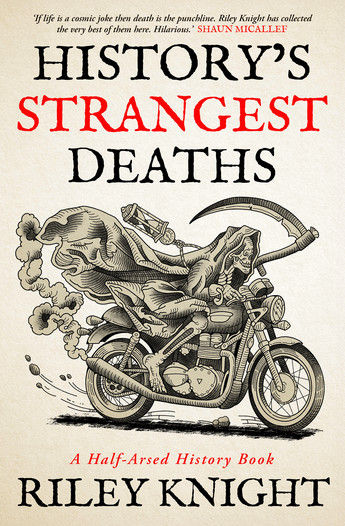Q&A with Riley Knight from Half-Arsed History
- Allen & Unwin

- Jul 31, 2025
- 4 min read
We chat with Half-Arsed History podcast host and author Riley Knight about their book History's Strangest Deaths.

A&U: Hi Riley! Thanks so much for chatting with us. What made you start your podcast series Half-Arsed History?
RK: Many years ago I worked as a tour guide in Berlin, and on one tour someone suggested I record the I stuff I talked about on the tour and release it as a podcast. I decided to give it a go (hence why the first-ever episode is about Frederick the Great), and just kept going with the show as a little hobby over the years. I've been lucky enough for it to pick up some interest as time went on, so much so that I left my old teaching career behind to pursue podcasting as a profession instead.
A&U: You've covered some pretty weird stories on you podcast! What drew you to focus a whole book on this theme?
RK: One of the most popular mini-series of episodes I've done on the show is about the weirdest deaths from across history, and I didn't get the chance to explore some of these stories more fully in the podcast. Expanding these tales in written form was an extremely interesting thing to do, as well as tracking down new tales of strange deaths I hadn't covered on the podcast. As awful and tragic as it can be, death is a fascinating topic at the best of times, and this book really does prove the theory that comedy equals tragedy plus time.
A&U: Which of the fifty strange deaths in the book do you find the most unforgettable and why?
RK: Clement Vallandigham was an American lawyer who was defending a client against a murder charge. The prosecution alleged the client had shot the victim in a bar fight - but Vallandigham decided to argue that the victim had accidentally shot himself while drawing his own pistol. To illustrate this point, Vallandigham demonstrated just how someone might accidentally shoot themselves while drawing a pistol by, well, doing exactly that. As he acted out what might have happened, he didn't realise the pistol he was demonstrating with was loaded, and so shot himself in the guts and died. A very effective legal argument, certainly, but not one that's easily replicated.
A&U: While researching the stories for your book was there one that made you laugh out loud or think, 'There is NO way this ever happened'?
RK: The tale of Jarl Sigurd the Mighty is pretty absurd. He was a viking warrior who had travelled from Norway to Scotland to raid and pillage, and meta Pictish warlord named Máel Brigte the Bucktoothed in battle. Sigurd defeated Máel Brigte and personally decapitated him, taking his head as a trophy which he tied to his saddle - only for the unfortunate Máel Brigte's buck teeth to lacerate Sigurd's leg as he rode, which caused a lethal infection. It's not often that you avenge your own death from beyond the grave, but Máel Brigte managed it!
A&U: Why do you think bizarre deaths fascinate us so much?
RK: Death is such a huge, definitional part of our lives - not only do we experience the grief of losing loved ones, we go through life knowing that, eventually, death will come for us as well and there's nothing we can do about it. This is a very scary thought, and can generate a sort of morbid fascination with death and dying. Perhaps learning about strange, unusual, entertaining, or absurd ways that people have died is something that softens the rigid, uncompromising nature of death, by presenting a lighter side to one of life's darkest and most tragic aspects.
A&U: The book spans thousands of years and cultures. Were there any particular time periods that especially seemed prone to ridiculous deaths?
RK: I did make a very concerted effort to make sure a broad spectrum of periods and places were included in the book, but the overwhelming majority of tales of strange deaths come from more recent years, from the 20th century onwards. This is likely due to better record-keeping in the modern era - or maybe the steady advance of human civilisation hasn't just unlocked all new ways to live your life, but also all new ways to die. For instance, the final death covered in the book involved someone falling to their death from a skyscraper, which would have been a very difficult thing to achieve a thousand years ago.
A&U: If you could have three historical figures over for dinner who would they be and why?
RK: For someone who is so monumentally famous and historically influential, we have very few personal details about Leonardo da Vinci - it would be fascinating to get to know him, and to ask him about all his unfinished projects. Hypatia of Alexandria would also be very interesting to talk to, as one of the last great philosophers and scholars of antiquity, not to mention much of her life being shrouded in obscurity. Finally, I'd invite D.B. Cooper, a mystery man who hijacked a plane in 1971, successfully ransomed it for $2 million in today's terms, and parachuted away into the wilderness, never to be seen again. Man, he'd be an interesting person to chat with.
Check out Riley's podcast Half-Arsed History here
or wherever you get your podcasts!

History's Strangest Deaths
by Riley Knight
True stories of extraordinary deaths throughout history to the modern day from the host of the popular Half-Arsed History podcast.





Comments